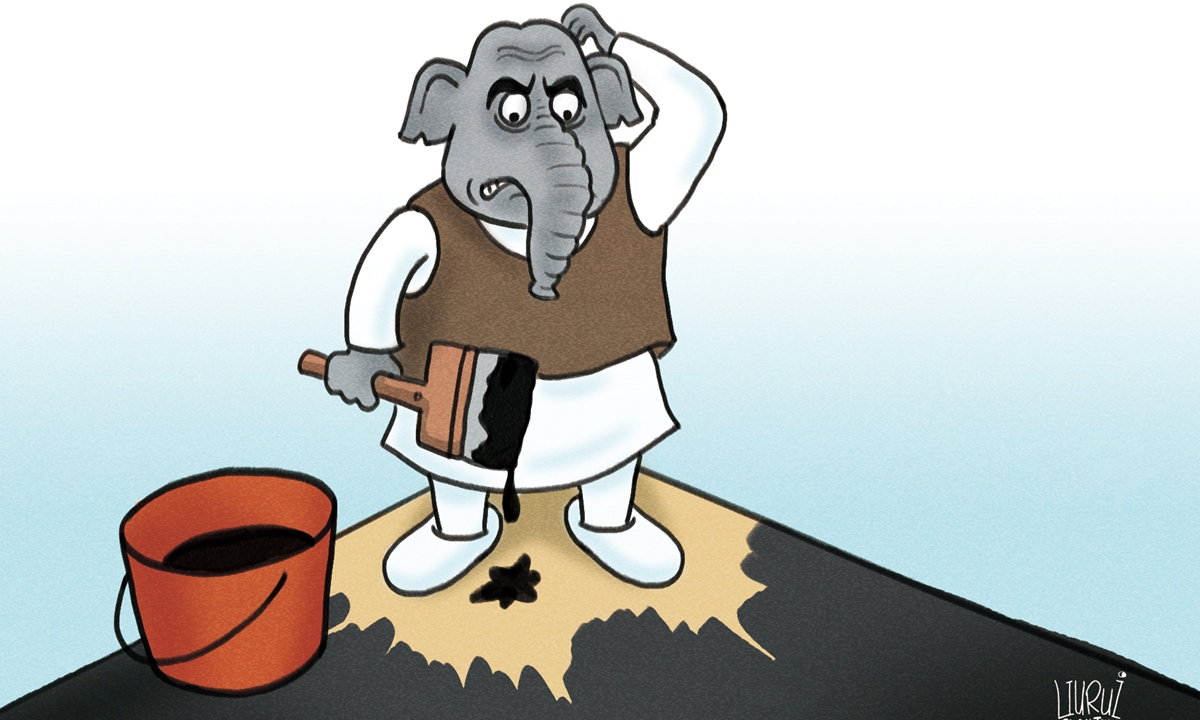
What next for India? Illustration: Liu Rui/GT
For the first time since 2000, the annual Russia-India summit was called off. It is a sign of clear cracks between Moscow and New Delhi.
Some analysts believe that Russia and India are not allies, but they have a relationship far beyond a mere alliance. The two countries are not neighbors and they have not had major conflicts of interests in the past. In recent years, Moscow and New Delhi have their strategic partnership stable. India-Russia relations are one of Special and Privileged Strategic Partnership. They stay close in terms of defense and intelligence sharing. Leadership changes in the two countries have not affected their close ties - the past 20 consecutive annual Russia-India summits are proof of this amity.
Although both Russia and India said this year's meeting was cancelled due to the COVID-19 pandemic, it cannot cover the two countries' disputes about major issues. Both sides have concerns and different views about the other's diplomatic policies.
Moscow sees that New Delhi has been getting closer to Washington as two formed a quasi defense alliance. This has severely infringed upon the interests of the traditional weapons trade between Russia and India. Russia accounts for over half of India's weapons imports. But recently Washington has increasingly imposed pressure on New Delhi over its purchase from Moscow.
When delivering an address to a Moscow-based think tank on December 8, Russian Foreign Minister Sergei Lavrov accused the US-led West of attempting to "undermine" Russia's close partnership and privileged relations with India.
Russian President Vladimir Putin in October attended the videoconference of the 17th annual meeting of the Valdai International Discussion Club. When talking about countries which have gained more influence, he mentioned China, Germany, Brazil and South Africa, but did not say anything about India. This could be construed as Putin expressing discontent over New Delhi's embrace of Uncle Sam.
From the perspective in New Delhi, there could be complaints over some of Moscow's moves. Russia has gradually upgraded its relations with China as bilateral relations enter a comprehensive strategic partnership of coordination for a new era.
Moreover, India's border disputes with China can be a challenge for the country. Some Indian elites now regard Beijing as their greatest threat. India is dissatisfied to see Russia's close ties with China.
Furthermore, India is also worried about Russia's developing ties with Pakistan, which is seen as a foe by India. Bloomberg reported that Moscow will coordinate with Islamabad to start building a 1,100-kilometer pipeline in July 2021.
Additionally, Moscow has repeatedly expressed their stances over a quadrilateral security dialogue, an informal strategic forum between the Washington, New Delhi, Tokyo and Canberra—which is also known as the QUAD. Roman Babushkin, the chargé d'affaires at the Russian embassy to India, recently said the "QUAD would be detrimental to inclusive dialogue in the region." On December 8, Lavrov called the QUAD a "devious policy" by Western powers to engage India in "anti-China games."
When India hears higher voices from Russia issue warnings, India will become more cautious. This will form restrictions on future cooperation between India and the US, especially in their defense cooperation - dampening New Delhi's enthusiasm to participate in the QUAD.
Cracks are emerging in Russia-India ties. Where this bilateral relationship heads will depend on the development of China-Russia, US-Russia, US-India and China-US relations.
If ties between the US and India keep heating up; if US and Russia tensions continue to mount; if the US and China antagonism goes on unabated, cracks between India and Russia will always exist.
But in general, cooperation between Moscow and New Delhi now outweigh their tensions. Their current rift will not cause qualitative changes in their relations anytime soon.
Meanwhile, China-Russia ties are stable. Both sides regard each other as an important force for maintaining world peace and stability. Joe Biden is about to take office. Moscow has always questioned the Democratic Party's policies toward Russia. The Democratic Party not only backs piling geopolitical pressure against Russia, it has also been very good at playing the democratic values card. This will pose serious challenges for Moscow policymakers and the Kremlin.
China-US relations will also encounter challenges and uncertainties. For example, the Trump administration has created many traps for the new Biden government over China-related issues. Does Biden have the will and determination to eliminate them one by one? How will the new administration adjust US China policy? More time is needed to tell.
The author is director of the research department at the National Strategy Institute at Tsinghua University. opinion@globaltimes.com.cn




